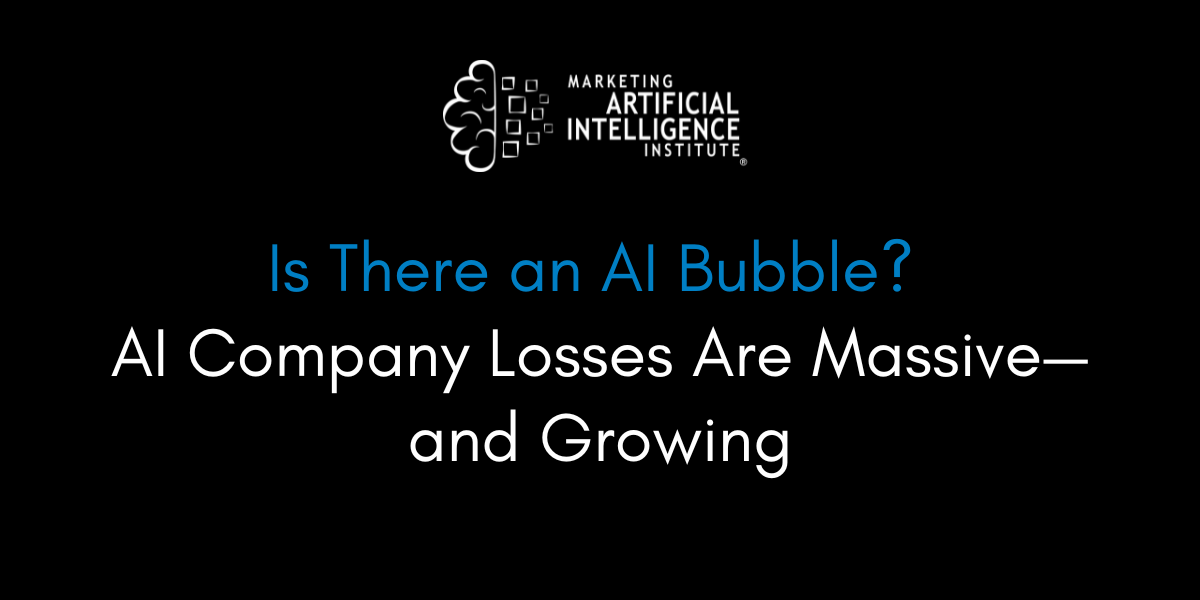As generative AI companies race to develop more advanced models, a pressing question emerges: Are we in an AI bubble?
Long-time AI watchers are increasingly asking the question, especially as new reports emerge about OpenAI’s staggering losses. According to The Information, the company’s on track to lose up to $5 billion in 2024.
So, are we in a bubble? Is AI over-invested and overhyped?
I got the answers from Marketing AI Institute founder and CEO Paul Roetzer on Episode 107 of The Artificial Intelligence Show.
OpenAI's eye-watering losses
According to an analysis by The Information, OpenAI could be facing losses of up to $5 billion this year. This projection is based on:
- AI training and inference costs estimated at $7 billion for 2024
- $1.5 billion in staffing costs for about 1,500 employees
- Total operating costs potentially reaching $8.5 billion
- Projected revenue between $3-3.5 billion
Other companies like Anthropic are also burning through cash, with estimated losses of $2.7 billion this year and significantly less revenue than OpenAI.
But there may be more to the story than meets the eye.
The bigger picture: a calculated risk
While these numbers might seem alarming, Roetzer offers a different perspective:
“As crazy as it sounds, losing $5 billion or more in a year is insignificant in the grand scheme of what they’re pursuing and the market potential they’re pursuing,” says Roetzer. “$5 billion is nothing.”
Roetzer points out that major tech companies like NVIDIA and Google have R&D budgets that dwarf these losses. And the key is to understand the strategic thinking behind these massive investments.
Roetzer points to a recent post by Doug Clinton of Deepwater Asset Management, where he frames the AI investment strategy as a modern version of “Pascal's wager.”
Pascal’s wager is a philosophical argument posed by philosopher and mathematician Blaise Pascal in the 17th century. The original argument essentially broke down belief in the existence of God into a rational probabilistic argument, not an emotional or belief-driven one.
(The result being: Even the most skeptical non-believer should logically just choose to live as though God exists, since there’s no real downside to being wrong.)
Clinton makes the same argument about AI, structuring the thinking in the following manner:
- If AI is profound and you invest heavily: You capture hundreds of billions in incremental annual revenue.
- If AI is overblown but you invest: You waste money on infrastructure that can be repurposed.
- If AI is profound but you don't invest: You lose significant ground to competition.
- If AI is overblown and you don't invest: You save money but miss out on potential trillion-dollar markets.
AI is a Pascalian wager for the megacaps.
— Doug Clinton (@dougclinton) July 8, 2024
If a megacap decided to stop investing in AI, best case is saving ~$200b vs a $2t+ market cap. Worst case is missing an AI windfall of $100b's/yr for competitors. That's Pascalian hell. It's not worth risking hell to slow down. https://t.co/zfap8lyiS5 pic.twitter.com/G9G9m3F7zE
Basically, there are infinite downsides to not betting on AI. You don’t gain much by being right. You stand to lose a lot if you’re wrong.
This framework explains why tech giants are making such enormous bets on AI.
Tech leaders double down
Recent statements from industry leaders reinforce this strategic approach, says Roetzer. He points to a post from David Cahn, a partner at Sequoia, that breaks down the game theory at work here even further.
Google and Meta CEOs both out in last 24 hours now agreeing with my AI Arms Race narrative.
— David Cahn (@DavidCahn6) July 24, 2024
There are 4 major players in this game theory problem, and two are now on-the-record about their strategies. pic.twitter.com/ZS34D3VhVY
In other words…
The “bubble” behavior is actually more likely highly rational behavior from the major players in AI.
What this means for businesses
While the losses and investments in AI might seem staggering, they represent a calculated bet on a potentially transformative technology. As Roetzer puts it, "At the end of the day, it looks like the models are going to keep getting bigger and smarter."
That makes sitting on the sidelines exceptionally risky. Companies that wait to see if AI will be "profound" may find themselves left behind.
For now, all signs point to continued growth and investment in AI. The question for businesses isn't whether or not to engage with AI, but how quickly and strategically they can do so.
Mike Kaput
As Chief Content Officer, Mike Kaput uses content marketing, marketing strategy, and marketing technology to grow and scale traffic, leads, and revenue for Marketing AI Institute. Mike is the co-author of Marketing Artificial Intelligence: AI, Marketing and the Future of Business (Matt Holt Books, 2022). See Mike's full bio.


